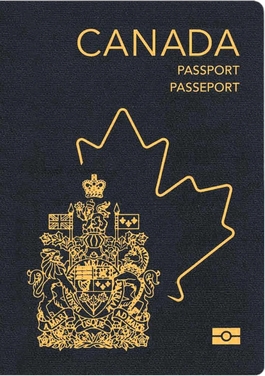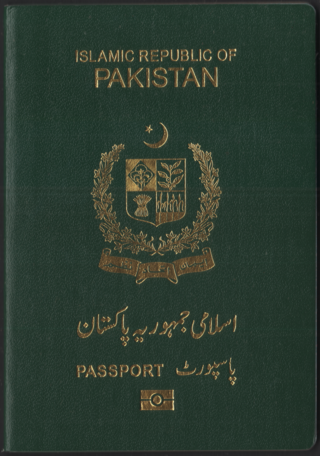
The Department of Immigration and Border Protection (DIBP) was a department of the Government of Australia that was responsible for immigration, citizenship and border control. It has now been subsumed into the Department of Home Affairs, which combines its responsibilities with a number of other portfolios.

A Canadian passport is the passport issued to citizens of Canada. It enables the bearer to enter or re-enter Canada freely; travel to and from other countries in accordance with visa requirements; facilitates the process of securing assistance from Canadian consular officials abroad, if necessary; and requests protection for the bearer while abroad.
The European Union Visa Information System (VIS) is a database containing information, including biometrics, on visa applications by Third Country Nationals requiring a visa to enter the Schengen area.

The passport of the Republic of Lebanon is a passport issued to the citizens of the Republic of Lebanon to enable them to travel outside the Republic of Lebanon and entitles the bearer to the protection from the diplomatic missions and consulates of the Republic of Lebanon if necessary. It is issued exclusively by the Lebanese Directorate General of General Security (DGGS), and can also be issued at various Lebanese diplomatic missions and/or consulates outside the Republic of Lebanon. It allows the bearer a freedom of living in the Republic of Lebanon without any immigration requirements, participate in the Lebanese political system, entry to and exit from the Republic of Lebanon through any port, travel to and from other countries in accordance with visa requirements, facilitates the process of securing consular assistance abroad from the diplomatic missions and consulates of the Republic of Lebanon if necessary, and requests protection for the bearer while abroad.

The Australian government has a policy and practice of detaining in immigration detention facilities non-citizens not holding a valid visa, suspected of visa violations, illegal entry or unauthorised arrival, and those subject to deportation and removal in immigration detention until a decision is made by the immigration authorities to grant a visa and release them into the community, or to repatriate them to their country of origin/passport. Persons in immigration detention may at any time opt to voluntarily leave Australia for their country of origin, or they may be deported or given a bridging or temporary visa. In 1992, Australia adopted a mandatory detention policy obliging the government to detain all persons entering or being in the country without a valid visa, while their claim to remain in Australia is processed and security and health checks undertaken. Also, at the same time, the law was changed to permit indefinite detention, from the previous limit of 273 days. The policy was instituted by the Keating government in 1992, and was varied by the subsequent Howard, Rudd, Gillard, Abbott, Turnbull, Morrison and Albanese Governments. The policy is regarded as controversial and has been criticised by a number of organisations. In 2004, the High Court of Australia confirmed the constitutionality of indefinite mandatory detention of non-citizens. However, this interpretation was overturned in a landmark decision, NZYQ v Minister for Immigration, in 2023, with the High Court concluding the practice was unlawful and unconstitutional.

The visa policy of Canada requires that any foreign citizen wishing to enter Canada must obtain a temporary resident visa from one of the Canadian diplomatic missions unless they hold a passport issued by one of the 54 eligible visa-exempt countries and territories or proof of permanent residence in the United States.
Visa requirements for Canadian citizens are administrative entry restrictions by the authorities of other states placed on citizens of Canada.
According to the January 2024 Henley Passport Index, holders of a Canadian passport can visit 188 countries and territories without a visa or with a visa on arrival, ranking the Canadian passport 7th in the world.

Visa requirements for Romanian citizens are the administrative entry restrictions by the authorities of other territories affecting citizens of Romania. As of January 2024, Romanian citizens had visa-free or visa on arrival access to 179 countries and territories, ranking the Romanian passport 13th in terms of travel freedom, according to the Henley Passport Index.

Visa requirements for Pakistani citizens are administrative entry restrictions imposed on citizens of Pakistan by the authorities of other states. As of December 2023, Pakistani citizens had Visa free, visa-on-arrival and eVisa access to 77 countries and territories. All of the updated links and visa-related requirements can be found listed in the chart below. Pakistani passport holders that hold multi-entry visas or permanent residency permits in certain European countries, Canada, USA, GCC states or Australia may grant the ability to apply for eVisas to certain nations, as well as Visa on Arrival access that they would not have without visas to these nations. The Pakistani passport is currently ranked 102nd in terms of travel freedom according to the Henley Passport Index in the third Quarter of 2023.
Visa requirements for Tongan citizens are administrative entry restrictions by the authorities of other states placed on citizens of Tonga. As of 2 July 2019, Tongan citizens had visa-free or visa on arrival access to 123 countries and territories, ranking the Tongan passport 46th in terms of travel freedom according to the Henley Passport Index.

Visa requirements for Venezuelan citizens are administrative entry restrictions by the authorities of other states placed on citizens of Venezuela.
As of 2024, Venezuelan citizens had visa-free or visa on arrival access to 126 countries and territories, ranking the Venezuelan passport 46th in the world according to the Henley Passport Index.

Visa requirements for Slovak citizens are administrative entry restrictions by the authorities of other states placed on citizens of Slovakia. As of January 2024, Slovak citizens had visa-free or visa on arrival access to 186 countries and territories, ranking the Slovak passport 9th in terms of travel freedom according to the Henley Passport Index.

The visa policy of the United Kingdom is the policy by which His Majesty's Government determines visa requirements for visitors to the United Kingdom, and the Crown dependencies of Guernsey, Jersey, and the Isle of Man and those seeking to work, study or reside there.

The Five Nations Passport Group is an international forum for the passport-issuing authorities of Australia, Canada, New Zealand, the United Kingdom and the United States to share best practices in the issuance, development, and management of passports. The annual Five Nations Passport Conference is a largely informal in-person meeting between officials of the participating agencies, with some additional invited guests such as the Irish Department of Foreign Affairs and Trade in 2011. It has taken place since at least as far back as 2004.
Biometrics refers to the automated recognition of individuals based on their biological and behavioral characteristics, not to be confused with statistical biometrics; which is used to analyse data in the biological sciences. Biometrics for the purposes of identification may involve DNA matching, facial recognition, fingerprints, retina and iris scanning, voice analysis, handwriting, gait, and even body odor.
Visa requirements for Zimbabwean citizens are administrative entry restrictions by the authorities of other states placed on citizens of Zimbabwe. As of 2 July 2019, Zimbabwean citizens had visa-free or visa on arrival access to 64 countries and territories, ranking the Zimbabwean passport 80th in terms of travel freedom according to the Henley Passport Index.

Migrant crisis is the intense difficulty, trouble, or danger situation in the receiving state due to the movements of large groups of immigrants escaping from the conditions which negatively affected their situation at the country of origin (departure). The "crisis" situation is not the refugee numbers but the system's failure to respond in an orderly way to the government's legal obligations. Some notable crises are; European migrant crisis, English Channel migrant crisis and World War II evacuation and expulsion.
Border Five is an informal forum on customs and border management policy issues with participation from Australia, Canada, New Zealand, the United Kingdom and the United States. The participating authorities are:

The European Union Agency for the Operational Management of Large-Scale IT Systems in the Area of Freedom, Security and Justice (eu-LISA) is an agency of the European Union (EU) that was founded in 2011 to ensure the uninterrupted operation of large-scale IT systems within the area of freedom, security and justice (AFSJ), that are instrumental in the implementation of the asylum, border management and migration policies of the EU. It began its operational activities on 1 December 2012.
The migration and asylum policy of the European Union is within the area of freedom, security and justice, established to develop and harmonise principles and measures used by member countries of the European Union to regulate migration processes and to manage issues concerning asylum and refugee status in the European Union.











